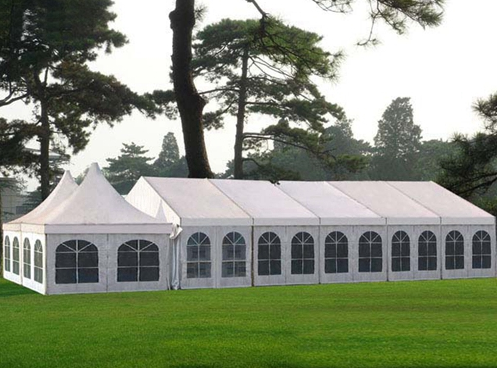The quality of the aluminum alloy used in the frame is a key determinant. High - grade aluminum alloys, such as 6061 - T6 or 6082 - T6, are more expensive. These alloys offer better strength, corrosion resistance, and durability. For example, a tent with a 6082 - T6 aluminum alloy frame, which has a higher strength - to - weight ratio and excellent corrosion resistance due to its chemical composition and heat - treatment process, will be priced higher than one with a lower - grade alloy. The thickness of the aluminum profiles also matters. Thicker profiles can withstand greater loads but increase the material cost. A tent designed for industrial storage with thick - walled aluminum alloy profiles to bear heavy goods will be costlier than a small - scale event tent with thinner profiles.
The choice of tent fabric significantly impacts the price. PVC - coated polyester fabric is commonly used and relatively affordable. It provides good waterproof and UV - resistant properties. However, for more demanding applications, materials like PTFE (Teflon) - coated fabric are preferred. PTFE - coated fabric has superior resistance to extreme weather conditions, high - temperature stability, and self - cleaning properties, but it comes at a much higher cost. Additionally, the fabric's weight, thickness, and fire - resistance rating (such as B1 or A - class) affect the price. A tent with a high - grade, fire - resistant fabric suitable for use in areas with strict safety regulations will be priced accordingly.
Larger tents naturally cost more due to the increased amount of materials required. The price is not just a linear increase with size. As the tent gets bigger, the engineering and structural requirements become more complex. For instance, a 50x80 - meter tent will need more substantial support structures to ensure stability, which means more aluminum alloy components and potentially a more robust tent fabric. Also, if the tent has an irregular shape or a unique design, such as a custom - shaped event tent with multiple curves or angles, the manufacturing process becomes more intricate, increasing the cost. Special design features may require additional engineering calculations and custom - made components.
The type and number of doors and windows in the tent affect the price. Basic roll - up doors are relatively inexpensive, while more sophisticated options such as automatic sliding doors or French doors with high - quality hardware add significant cost. Similarly, different window types, like clear PVC windows, mesh windows for ventilation, or glass - paned windows, have different price points. A tent with multiple large, glass - paned windows for a high - end event will be much more expensive than a simple storage tent with a few small PVC windows.
Interior equipment such as lighting systems, heating or cooling units, and flooring also impacts the price. Installing a professional - grade lighting system with dimmable lights and energy - efficient bulbs in an event tent will increase the cost. Heating and cooling systems, whether portable air conditioners or industrial - grade heaters, add to the expense, especially if they need to be integrated into the tent's structure. Different flooring options, from simple ground - covering mats to high - quality wooden or composite flooring, also contribute to the overall price variation.


Hi! Welcome back.
How are you doing?

+86 17712768856
NO.1319-1 Xicheng Rood Qingyang village, Jiangyin City,Jiangsu Province,China
Subscribe today and get educated and entertained with the monthly SYXTENT email